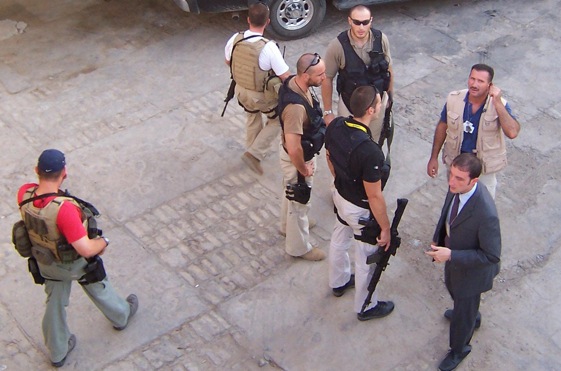Blackwater Heir Wants to Keep State Dept. Security Contract
The firm faces a wrongful death lawsuit stemming from a 2007 shooting incident in Baghdad.
Jul 31, 202041.1K Shares1.2M Views
Blackwater Security contractors protect U.S. State Department employees in Baghdad. (Flickr: jamesdale10)
Even as a wrongful-death lawsuit moves forward against the controversial private security company formerly known as Blackwater, the firm seeks to renew its contract with the State Department to guard diplomats when the deal expires next year. And the State Department shows no signs of ruling the company out of competition, despite a high-profile incident in 2007 that left 17 Iraqi civilians dead.
“We welcome the chance to bid on any program,” said Stacy DeLuke, a spokeswoman for the private security company Xe, which changed its name from Blackwater earlier this year, using an acronym for the Worldwide Personal Protective Services contract. Asked if the company was under any restrictions from the State Department following its September 2007 shootout in Baghdad’s Nisour Square — in which its employees shot a family in a car approaching their guards and then opened fire on other cars attempting to flee the scene — DeLuke replied, “I don’t think there have been any restrictions.”
Illustration by: Matt Mahurin
In 2005, the State Department issued a four-year contract, valued at $560 million per year, to provide on-the-ground security for its diplomats in dangerous areas around the world with three leading private security companies: Blackwater, Triple Canopy and DynCorp. The U.S. military does not consider the provision of security for diplomats in war zones to be its job. The State Department’s Bureau of Diplomatic Security, which controls the WPPS contract, possesses a workforce of about 1450 special agents, leading it to rely on contractors for security, according to a 2007 investigation by Rep. Henry Waxman (D-Calif.).
Spokespeople for the other private security firms holding the WPPS contract would not comment on whether they would also seek to retain their stakes in the contract. A DynCorp spokesman, Douglas Ebner, indicated that his company would, saying that DynCorp has “a strong focus on winning re-competes in our core business areas, including contracts with the U.S. Department of State.” Triple Canopy’s marketing director, Jayanti Menches, said simply that Triple Canopy does not “normally discuss our strategy with regard to future business opportunities.”
The WPPS contract formally expires in the summer of 2010, but the State Department anticipates releasing a request for bids on the work as early as November, according to a spokesman.
Xe has had a controversial history in Iraq. In March of 2004, the Moyock, N.C.-based company, which maintains close ties to the Republican Party, lost four contractors to an angry mob in the city of Fallujah. After the 2007 shooting incident in Nisour Square attracted a fresh wave of criticism, a congressional investigation led by Waxman in his role as chairman of the House Oversight and Government Reform Committee discovered a series of prior incidents foretelling the killings. In December 2006, a security guard employed by the company drunkenly shot a bodyguard for one of Iraq’s vice presidents, and the company colluded with the State Department to ferry the guard out of Iraq. A few months later, company employees killed an Iraqi driver near the Interior Ministry.
Between 2005 and 2007, company guards were involved in an average of “1.4. shooting incidents per week,” according to a committee report issued in October 2007. Waxman’s report estimated that the company stood to gain $1.2 billion from the WPPS contract.
A 2007 official report by Amb. Patrick Kennedy, now the State Department’s undersecretary for management, on the State Department’s ties with private security firms in Iraq recommendedthat the secretary of state, among other measures, “tighten the ground rules for the use of deadly force” and “work towards greater parallelism with the [U.S. Central Command] rules on the use of force by contracted security personnel in Iraq.” Earlier this year, at Iraqi behest, the State Department evicted Xe from Iraq, although some Xe guards remain in the country.
The company’s troubles have persisted. Family members of the victims of the Nisour Square shootings filed a wrongful death lawsuitagainst the company in a U.S. federal court in 2007. In a surprising development, as part of the suit, two former Blackwater guards signed affidavits last week implicating founder Erik Prince in the killings of employees who cooperated with federal investigators and further alleging that the company is involved in weapons smuggling in Iraq, according to The Nation’s Jeremy Scahill— charges the company called “anonymous, unsubstantiated and offensive” in a statement. Prince stepped down from the company earlier this year when it renamed itself Xe, a move intended to “define the company as what it is today and not what it used to be,” spokeswoman Anne Tyrell toldThe Washington Post in February.
While Xe may no longer be operating in Iraq, it is the only private security company guarding State Department employees in Afghanistan, according to a department official who would not speak for attribution. “Right now in Afghanistan, it is simply U.S. Training Center,” the official said, referring to a company owned by Xe.
Already, Xe has come under criticism for aggressive actions in Afghanistan reminiscent of its Iraq behavior. In May, off-duty security guards employed by a company subsidiary drunkenly fired upon a car in Kabul, injuring two civilians. Last month, McClatchy reporter Nancy Youssef observedState Department officials in Kabul riding in “security details outfitted with huge SUVs and pointed weapons,” alarming the city’s residents. Those details would have been operated by Xe.
The need for increased diplomatic security in Afghanistan is expected to rise as the State Department increases its presence in the war-plagued country. A recent report prepared by the Congressional Research Service found that the Obama administration plans to double its U.S. civilian personnel in Afghanistan to 900 officials, a substantial portion of which will be provided by the State Department.
A spokesman for the State Department’s Bureau of Diplomatic Security, which manages the WPPS contract, said he could not answer TWI’s questions about the department’s relationship with private security companies in Afghanistan by press time, although he said he hoped to provide responses later this week. Representatives of U.S. Central Command, which controls U.S. forces in the Middle East and South Asia, referred questions about the military’s coordination with private security companies in Afghanistan to the State Department. Spokespeople for the U.S. military command in Afghanistan did not reply to requests for comment about its relationship with private security companies.
On Friday, CNN obtaineda letter penned by Rep. Jan Schakowsky (D-Ill.) to Secretary of State Hillary Rodham Clinton urging the secretary “not to enter into further contracts with Xe and to immediately review any existing contracts.” As a senator and candidate for president, Clinton pledgedto ban private security firms from contracting with the government, but reversed herself at her confirmation hearingto become secretary of state in January.
Gen. Stanley McChrystal, the commander of U.S. troops in Afghanistan, testified in June to the Senate Armed Services Committee that the loyalties of the Afghan people would be “strategically decisive” for the war.
“Running civilians off the road is contrary to [the] mission goals,” said P.W. Singer, a Brookings Institution scholar and author of a well-regarded bookabout the private security industry. “That has to stop. But what are the consequences?” Singer noted that the laws under which security contractors operate overseas are far from clear, a problem that has long vexed both the industry, U.S. officials and members of Congress, contributing to an atmosphere of impunity.
As Singer put it, “We have a tough enough time figuring out the consequences [to the companies] when they kill someone.”

Paula M. Graham
Reviewer
Latest Articles
Popular Articles

